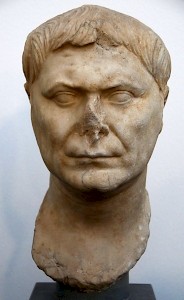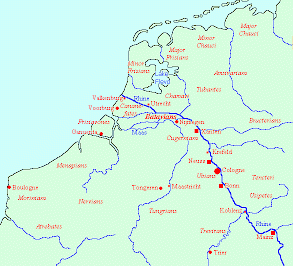Quintus Petillius Cerialis
Quintus Petillius Cerialis: Roman general, son-in-law of the emperor Vespasian, suppressed the Batavian revolt (70).

Quintus Petillius Cerialis Cesius Rufus was probably born in Umbria in Italy. It is possible that he was the son of a senator named Petilius Rufus, who accused a friend of the Roman prince Germanicus in 28.
We don't know anything about his son's early career, except for the fact that he was commander of the Ninth legion Hispana in 60. This unit was stationed in two camps at Longthorpe and Newton-on-Trent. According to our sources, it suffered heavy losses -about a third of its strength- during the revolt of queen Boudicca. He did not reach the next stage of the usual sequence of offices (cursus honorum), the consulship, which suggests that Cerialis was held responsible for the defeat.
Legion commanders were usually former praetors and as such, they had to be in their early thirties, because there was a minimum age for the praetorship: one had to be 30 years old. Therefore, Cerialis must be born in 29 or earlier, and was at least ten years older than his wife Flavia Domitilla. She was the daughter of Titus Flavius Vespasianus, a successful Roman general who had played an important role in the Roman invasion of Britain (43) and was consul in 51. Domitilla was dead before 1 July 69, the day on which her father was proclaimed emperor in Judaea.
The years 68-70 saw five emperors: Nero was forced to commit suicide in June 68 and succeeded by the old senator Galba; the commander of the Rhine army, Vitellius, revolted against Galba, who was murdered by soldiers of Otho (January 69); Otho was defeated by Vitellius' army, who was in turn defeated by the Danube army, which had sided with Vespasian of Judaea (October 69). Meanwhile, the provinces along the Rhine, Germania Superior and Germania Inferior, revolted (August 69), and one Julius Sabinus had assumed the purple (January 70). Cerialis was to play an important role in this chaotic situation.
In September, the legions of the Danube, commanded by Antonius Primus, had sided with Vespasian, invaded Italy, and defeated the army of Vitellius. But the latter was still powerful in Rome, and most relatives of Vespasian left Rome. Cerialis, on the other hand, had disguised himself as a peasant, and made his escape to the Apennines. Here, he commanded a small, irregular force that was able to occupy Campania, the important region south of Rome. When Cerialis' army, almost 1,000 cavalry, had made contact with the legions of Antonius Primus, and was advancing rapidly to Rome, another relative of Vespasian, Flavius Sabinus, occupied the Capitol, but he was defeated and executed. The armies of Antonius and Cerialis arrived too late, and, even worse, Cerialis was beaten back.
Hurling himself recklessly on an enemy he believed beaten, he had run into a mixed Vitellian force of infantry and cavalry. The encounter took place in the suburbs, amid buildings, gardens and winding lanes familiar to the Vitellians but formidable to the enemy, who were strangers to the area. Nor did the Vespasian cavalry cooperate well [...], and the commander of one regiment, Julius Flavianus, was captured. The rest suffered ignominious rout, though the victors did not keep up the pursuit beyond Fidenae.note
In spite of this setback, the legions were able to occupy Rome on the next day. Vitellius was killed near the Senate's building, and the city was looted. We do not know what role Cerialis played. What is certain, however, is that Vespasian rewarded him for his role in the civil war with a consulship in 70, perhaps in March and April.
Meanwhile, the Rhine border lay almost unguarded, because Vitellius had taken with him a large part of the armies of Germania Superior and Germania Inferior. The Batavians, who lived along the Lower Rhine, had revolted in August 69 (more), and on one of the first days of 70, the Trevirans and Sequani (in the valleys of the Mosel and Doubs) had joined the rebellion. They had proclaimed Julius Sabinus emperor.

Vespasian sent a large expeditionary force across the Alps, commanded by the man who had, until Domitilla died, been his son-in-law, Cerialis. It was one of the largest armies that any Roman general had commanded, and one wonders whether the size was not meant to compensate for Cerialis' lack of commanding skills.
The expeditionary force consisted of the victorious Eighth legion Augusta, the Eleventh Claudia and Thirteenth Gemina, the Twenty-first Rapax (which had been one of those supporting Vitellius), and, of the recently recruited legions, the Second Adiutrix. These were led across the Alps by the Great St Bernard and Mont Genevre passes, though part of the army took the Little St Bernard. The Fourteenth legion Gemina was summoned from Britain, and the Sixth Victrix and First Adiutrix from Hispania.note
The story of the liberation of Mainz, the battle in the valley of the Moselle, the capture of Trier and Cerialis' conciliatory measures, his march to the north, his victory at Xanten, and his invasion of the country of the Batavians, is told here.
The account of our only source, Tacitus, breaks off abruptly when he describes the negotiations between Cerialis and the Batavian leader Julius Civilis, which took place on a half-destroyed bridge somewhere in the Betuwe. (It is a tempting idea that the two men must have known each other from the British wars.)
It is not known what the two men discussed, but it is certain that the old alliance between Rome and the Batavians was restored: the latter were not compelled to pay taxes, but had to man eight auxiliary units.
Later that year, Cerialis went to Britain, where he commanded three legions in a war in southern Scotland, which had become necessarry because many troops had been sent from Britain to the Continent in the 69-70 crisis. Cerialis, using York as his base, conducted a successful campaign and was awarded, in 74, with a rare second consulship.
Cerialis and Flavia Domitilla had two sons: Gaius Petillius Firmus, an officer in the Fourth Legion Flavia in Dalmatia, and Quintus Petillius Rufus, consul in 83.